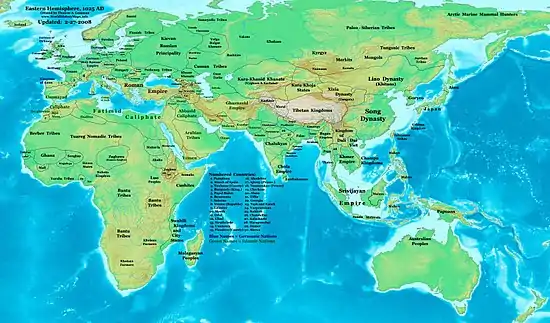List of countries by population in 1000
This is a list of countries by population in 1000. Estimate numbers are from the beginning of the year, and exact population figures are for countries that held a census on various dates in that year.
| Country/Territory | Population c. 1000 estimate | Percentage of World Population |
|---|---|---|
| World[1] | 310,000,000 [notes 1] | - |
| Song dynasty[2][3][4] | 75,000,000 | 24.19% |
| Chola dynasty
subdivisions
|
17,000,000 - 18,000,000 | |
| Byzantine Empire[5][6]
subdivisions
|
12,000,000 | 3.87% |
| Chalukya dynasty | 10,000,000-13,000,000 | |
| Holy Roman Empire
subdivisions
|
11,300,000 | 3.65% |
| Fatimid Caliphate[9][10] | 12,500,000 | 4.0323% |
| Kingdom of France[8] | 7,200,000 | 2.3% |
| Japan[12] | 7,000,000 | 2.26% |
| Caliphate of Córdoba. | 6,900,000 | 2.23% |
| Buyid dynasty | 6,500,000 | 2.10% |
| Kievan Rus'[13] | 5,400,000 | 1.74% |
| Toltec Empire
subdivisions
|
4,500,000 | 1.45% |
| Liao Empire[14] | 3,250,000 | 1.05% |
| Goryeo[10][notes 2] | 3,070,000 | 0.99% |
| Wari Empire
subdivisions
|
3,000,000 | 0.97% |
| Bulgarian Empire[10][15] subdivisions
|
2,087,000 | 0.67% |
| Makuria
subdivisions
|
2,000,000 | 0.65% |
| Principality of Hungary[16] | 1,250,000 | 0.40% |
| Kingdom of England[17][18] | 1,250,000 | 0.40% |
| Abbasid Caliphate[19] subdivisions
|
1,200,000 | 0.40% |
| Đại Việt kingdom[20] | 1,200,000 | 0.39% |
| Poland[21] | 1,000,000 | 0.32% |
| Alodia
subdivisions
|
1,000,000 | 0.32% |
| Zagwe dynasty
subdivisions
|
1,000,000 | 0.32% |
| Duchy of Bohemia[10] | 900,000 | 0.29% |
| Khmer Empire[10][notes 3] | 841,000 | 0.27% |
| High Kingship of Ireland[17] | 630,000 | 0.19% |
| Kingdom of Denmark[17] | 620,000 | 0.16% |
| Kingdom of Croatia[10] | 412,000 | 0.13% |
| Kingdom of Norway[17] | 400,000 | 0.13% |
| Kingdom of Scotland[17] | 300,000 | 0.10% |
| Duchy of Bosnia[10] | 286,000 | 0.09% |
| Kingdom of Sweden[17] | 280,000 | 0.06% |
| Prataharan Empire[22]
subdivisions
|
66,000 | 0.02% |
| Republic of Venice[23] | 60,000 | 0.02% |

Eastern Hemisphere Map at AD 1025
| Historical Demographics | ||
|---|---|---|
 Altar Domitius Ahenobarbus Louvre | ||
| Articles | ||
| Demographic history | ||
| Historical demography | ||
| World population estimates | ||
| List of Countries by Population | ||
| 1 | 1000 | 1500 |
See also
Bibliography
- Buringh, Eltjo (2010). Medieval Manuscript Production in the Latin West. Brill Publishers. ISBN 978-9004175198.
- Herlihy, David (1989), "Medieval Demography", in Strayer, Joseph R. (ed.), Dictionary of the Middle Ages, 4, New York: Scribner, ISBN 0-684-17024-8.
- Kiernan, Ben (2019). Việt Nam: a history from earliest time to the present. Oxford University Press. ISBN 9780190053796.
- Bolt, Jutta, Robert Inklaar, Herman de Jong and Jan Luiten van Zanden (2018). "Maddison Project Database, version 2018".CS1 maint: multiple names: authors list (link)
- Urlanis, B T︠S︡ (1941). Rost naselenii︠a︡ v Evrope : opyt ischislenii︠a︡ [Population growth in Europe] (in Russian). Moskva: OGIZ-Gospolitizdat. OCLC 42379320.
Notes
- Estimates range from 250,000,000 to 400,000,000
- Figures are for area of modern day South Korea alone.
- Figures are for the areas of modern Laos and Cambodia. None of modern south Thailand is included.
References
- Data from United Nations Department of Economic and Social Affairs, Population Division. Archived 2014-03-20 at the Wayback Machine
1950–2100 estimates (only medium variants shown): (a) World Population Prospects: The 2008 Revision. Archived 2010-08-19 at the Wayback Machine
Estimates prior to 1950: (b) "The World at Six Billion", 1999.
Estimates from 1950 to 2100: (c) "Population of the entire world, yearly, 1950 - 2100", 2013.
2014: (d) http://esa.un.org/unpd/wup/Highlights/WUP2014-Highlights.pdf "2014 World Urbanization Prospects", 2014.]
2015: (e) http://esa.un.org/unpd/wpp/Publications/Files/Key_Findings_WPP_2015.pdf "2015 World Urbanization Prospects", 2015.] - Ebrey, Walthall & Palais 2006, p. 156.
- Brook 1998, p. 96.
- Veeck et al. 2007, pp. 103–104.
- W. Treadgold, A History of the Byzantine State and Society, 570
- "Archived copy". Archived from the original on 2015-08-26. Retrieved 2015-07-23.CS1 maint: archived copy as title (link)
- The themes of Nikopolis, Hellas, Peloponnesos, Thessaloniki, Strymon, Cephalonia, and Crete.
- Buringh 2010, p. 72.
- "Appendix B Growth of World Population, GDP and GDP Per Capita before 1820 at 'www.ggdc.net/MADDISON/other_books/appendix_B.pdf'". Missing or empty
|url=(help) - Avakov, Alexander V. (April 2015). Two Thousand Years of Economic Statistics, Volume 1. ISBN 9781628941012. Retrieved 13 Oct 2017.
- Maddison 2018.
- (a) Jean-Noël Biraben, "The History of the Human Population From the First Beginnings to the Present" in "Demography: Analysis and Synthesis: A Treatise in Population" (Eds: Graziella Caselli, Jacques Vallin, Guillaume J. Wunsch) Vol 3, Chapter 66, pp 5–18, Academic Press, San Diego (2005). (b) Jean-Noël Biraben, "An Essay Concerning Mankind's Evolution", Population, Selected Papers, Vol. 4, pp. 1–13 (1980). (c) Jean-Noël Biraben, "Essai sur l'évolution du nombre des hommes", Population Vol. 34 (no. 1), pp. 13–25 (1979).
- Б.Ц.Урланис. Рост населения в Европе (PDF) (in Russian). p. 89.
- Ebrey (1996), 166.
- Péter Rabb, Natural conditions in the Carpathian Basin of the middle ages, 2007, p. 58
- Urlanis, B T︠S︡ (1941). Rost naselenii︠a︡ v Evrope : opyt ischislenii︠a︡ [Population growth in Europe] (in Russian). Moskva: OGIZ-Gospolitizdat. OCLC 42379320.
- "History of Wales".
- George Modelski, World Cities: –3000 to 2000, Washington DC: FAROS 2000, 2003. ISBN 0-9676230-1-4
- Kiernan 2019, p. 168.
- Jerzy Lukowski, Hubert Zawadzki, A Concise History of Poland, Cambridge University Press, 2001, ISBN 0-521-55917-0, Google Print, p.6
- "Populations of Largest Cities in PMNs from 2000BC to 1988AD". Archived from the original (TXT) on September 29, 2007. Retrieved 2018-06-29.
- Spruyt, H. (1996). The Sovereign State and Its Competitors: An Analysis of Systems Change. Princeton University Press. p. 132. ISBN 978-0-691-02910-8.
This article is issued from Wikipedia. The text is licensed under Creative Commons - Attribution - Sharealike. Additional terms may apply for the media files.